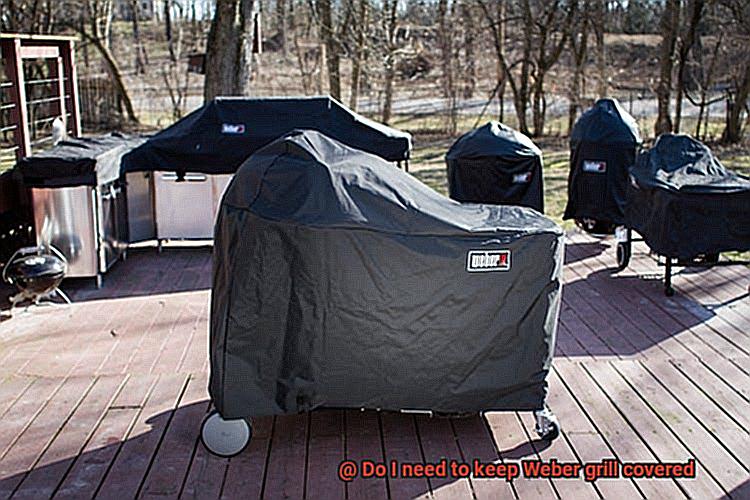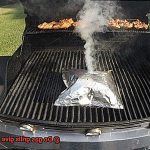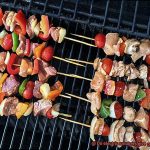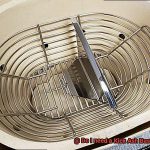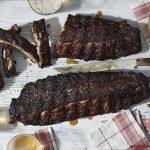Weber grills are the ultimate backyard or patio accessory, providing endless hours of outdoor cooking and entertainment. Whether you’re a seasoned grill master or a casual cookout enthusiast, keeping your Weber grill protected is crucial for its longevity and performance. The question on every grill owner’s mind is whether to cover or not to cover.
Covering your Weber grill has numerous benefits. It shields your grill from the elements, maintains its appearance, and prevents rust and corrosion. Uncovered grills are exposed to moisture and dirt that can damage the finish or internal components, making it essential to keep them covered.
However, some argue that covering your Weber grill may not be necessary. Some grillers believe that leaving a grill uncovered allows it to “breathe,” preventing moisture from accumulating and promoting proper airflow. Additionally, leaving your grill uncovered provides easy access for impromptu grilling sessions.
Regardless of which side of the debate you fall on, there are important factors to consider when deciding whether or not to cover your Weber grill. In this post, we’ll explore the pros and cons of keeping your Weber grill covered and provide guidelines for protecting your investment. So grab your favorite apron and get ready as we dive into this hotly debated topic.
Contents
What is a Weber Grill?
Founded in 1952 by George Stephen, a passionate welder and grilling enthusiast, Weber Grill has been providing high-quality charcoal, gas, and electric grills for over six decades. Their signature product, the Weber Kettle Grill, boasts a unique dome-shaped design that allows for better airflow and heat retention, making it a favorite among grill masters everywhere.
One of the most impressive aspects of Weber grills is their durability. Made from top-of-the-line materials like stainless steel and cast iron, these grills are built to last for years to come. But even the toughest grill needs a little extra protection from time to time.
Enter the custom-fit covers that Weber offers for many of its grills. These covers are designed to provide maximum protection while still allowing air circulation to prevent moisture buildup. By covering your grill when it’s not in use, you can help protect it from damage caused by rain, snow, and other harsh weather conditions. This will ensure that your grill stays in top shape for all of your future grilling adventures.
In addition to their durability, Weber grills also offer a wide range of products to suit every grilling need. From small portable grills perfect for camping trips to large outdoor kitchens for serious grill masters, there is something for everyone in the Weber lineup.
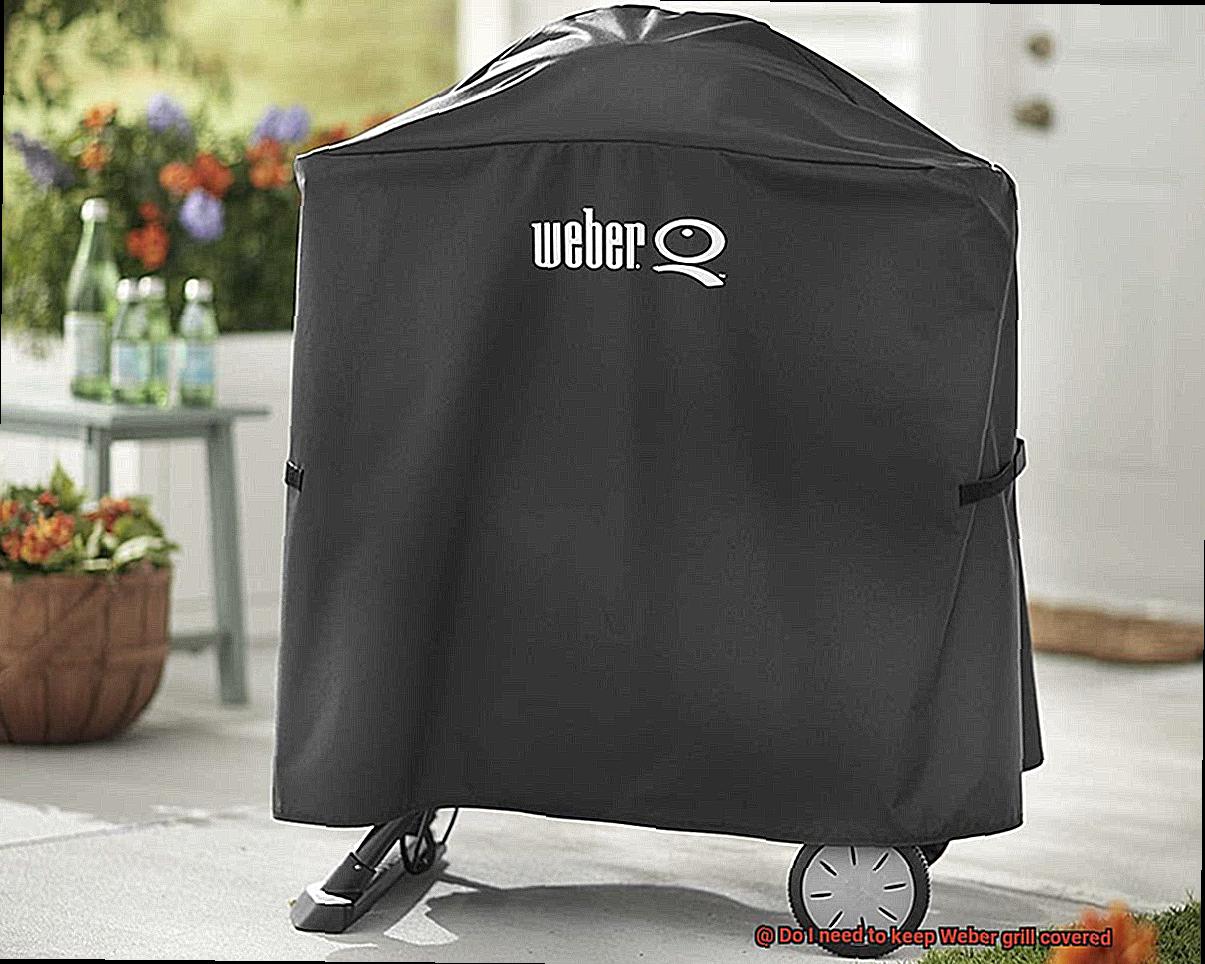
So what makes Weber grills stand out from the rest? Their commitment to quality and longevity. While it’s not strictly necessary to cover your grill when it’s not in use, doing so will help protect your investment and ensure that you’re able to enjoy delicious grilled meals for years to come.
Benefits of Covering Your Weber Grill
As a seasoned grill master, I can attest to the importance of protecting your Weber grill. Not only does it safeguard your investment but also ensures that it stays in top-notch condition for years to come. So, let’s take a deep dive into the benefits of covering your Weber grill.
Firstly, covering your Weber grill protects it from harsh environmental elements like rain, snow, and wind. These elements can cause rust and corrosion, reducing the lifespan of your grill significantly. By covering it up, you ensure that your grill remains well-protected and in good condition.
Secondly, covering your Weber grill helps keep it clean and hygienic. Dirt, dust, and debris can accumulate on the surface of the grill when left uncovered, making it unappealing to use. By covering it up, you prevent these particles from settling on your grill and make cleaning and maintenance a breeze.
Maintaining the appearance of your Weber grill is another significant benefit of covering it up. The cover prevents fading and discoloration caused by prolonged exposure to sunlight. This is particularly important if you have a stainless steel or colored Weber grill that you want to keep looking new for longer.
Pests like insects and rodents can also be deterred by covering your Weber grill. Leaving it uncovered makes it an inviting spot for pests to nest in. By keeping it covered, you make it less attractive to pests, reducing the likelihood of infestation.
Finally, covering your Weber grill keeps it ready for use whenever you need it. Accumulated moisture on an uncovered grill can make lighting it up problematic when you’re ready to cook. Covering your grill keeps it dry and ready for immediate use without any hassle.
Protecting the Grill from the Elements
Grilling is not just a hobby, it’s a passion. And as a grill master, you know that protecting your Weber grill from the elements is essential to ensure its longevity and keep it functioning at its best. Here are some tips on how to protect your grill and keep it in top condition:
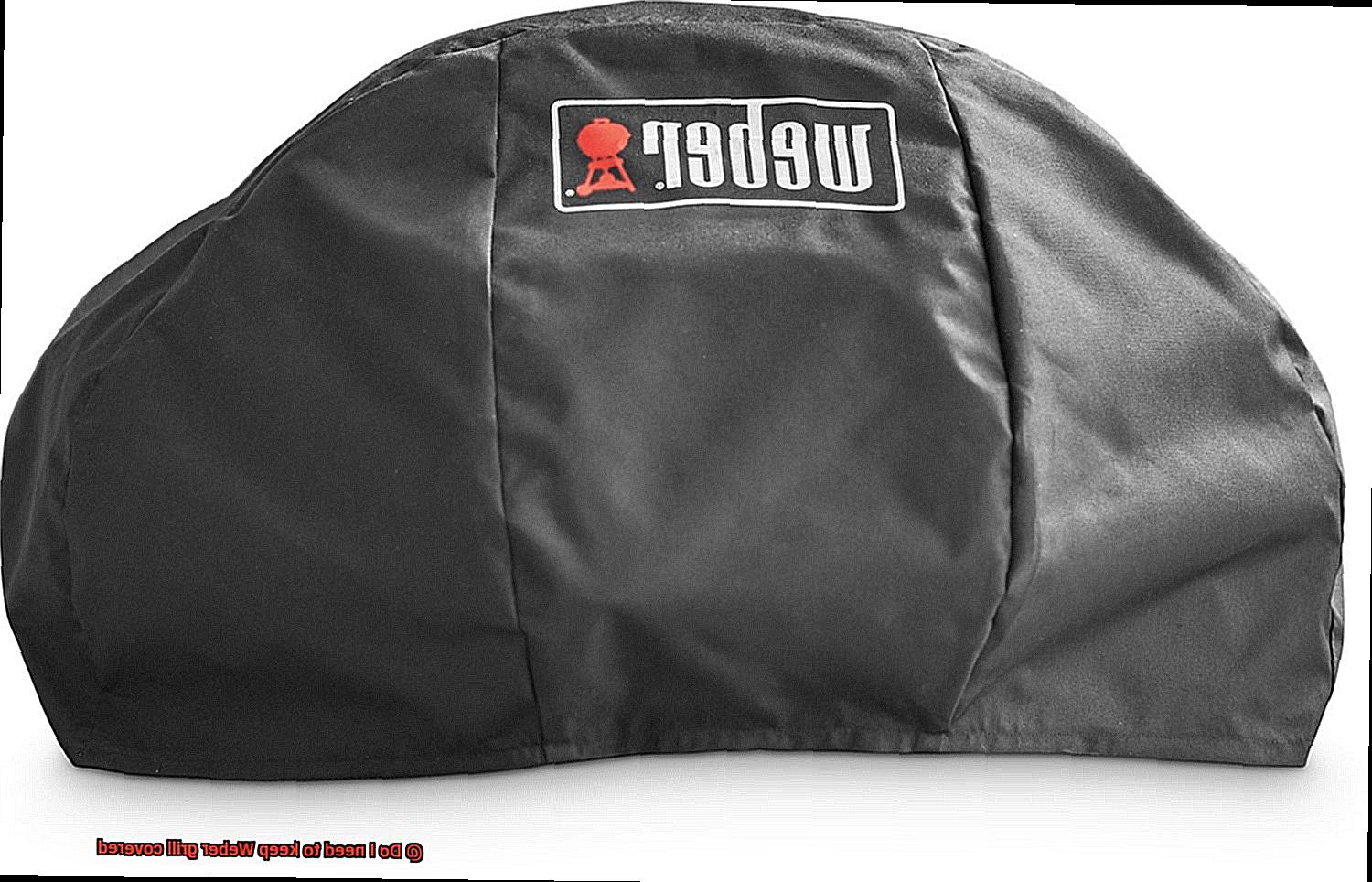
- Cover Up: Rain, snow, and wind can cause rust and corrosion, weakening the structure of your grill and affecting its cooking efficiency. A high-quality cover made from weather-resistant materials is a must to protect your grill from the elements. A custom-fit cover designed specifically for your Weber grill is ideal, as it will provide maximum protection and ensure a snug fit.
- Maintain Appearance: A covered grill is not just protected from the elements but also maintains its sleek appearance. Keeping your grill looking clean and well-maintained is essential, especially if you’re planning on selling or moving in the future.
- Deter Pests: Uncovered grills can attract unwanted pests like bees, wasps, and rodents. By keeping your grill covered, you’ll reduce the likelihood of these critters making a home inside your grill.
- Ready-to-Use: Keeping your grill covered when not in use ensures that it’s always ready for use without any hassle. No more wiping down a dirty grill before cooking – just uncover and fire it up.
- Hygienic and Clean: Preventing dirt, dust, and other debris from accumulating on the surface of your grill is essential to keep it hygienic and healthy to cook on. Regular cleaning with a soft-bristled brush or sponge with mild soap and warm water is recommended.
Keeping the Grill Clean and Free from Debris
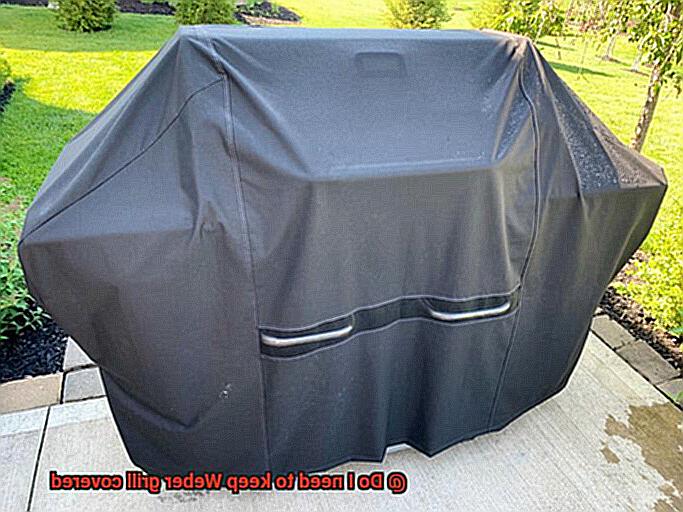
As a grill master, ensuring your Weber grill’s cleanliness and hygiene is crucial for both its longevity and your safety. Not only does it affect the taste of your food, but it can also lead to fire hazards if debris accumulates on the grill grates. Let’s dive into the steps necessary for keeping your Weber grill clean and free from debris.
First things first: remove the grates after each use and give them a thorough cleaning. Use a grill brush to scrub away any remaining debris and wash them with warm soapy water. For stubborn stains and grease, specialized grill cleaners are available to effectively remove them.
Now it’s time to tackle the inside of your grill. Turn up the burners to high heat for ten minutes to burn off any leftover food particles. Use a scraper or spatula to remove any remaining debris from the inside of the grill and wipe down the interior with a damp cloth.
In addition to cleaning, covering your Weber grill when not in use is essential. A cover protects your grill from environmental elements such as rain, snow, and wind, which can cause rust and damage to various components of your grill, including the burners, grates, and interior.
When selecting a cover for your Weber grill, ensure it fits snugly over the entire unit. You can purchase covers made specifically for Weber grills or opt for a universal cover that fits most grills.
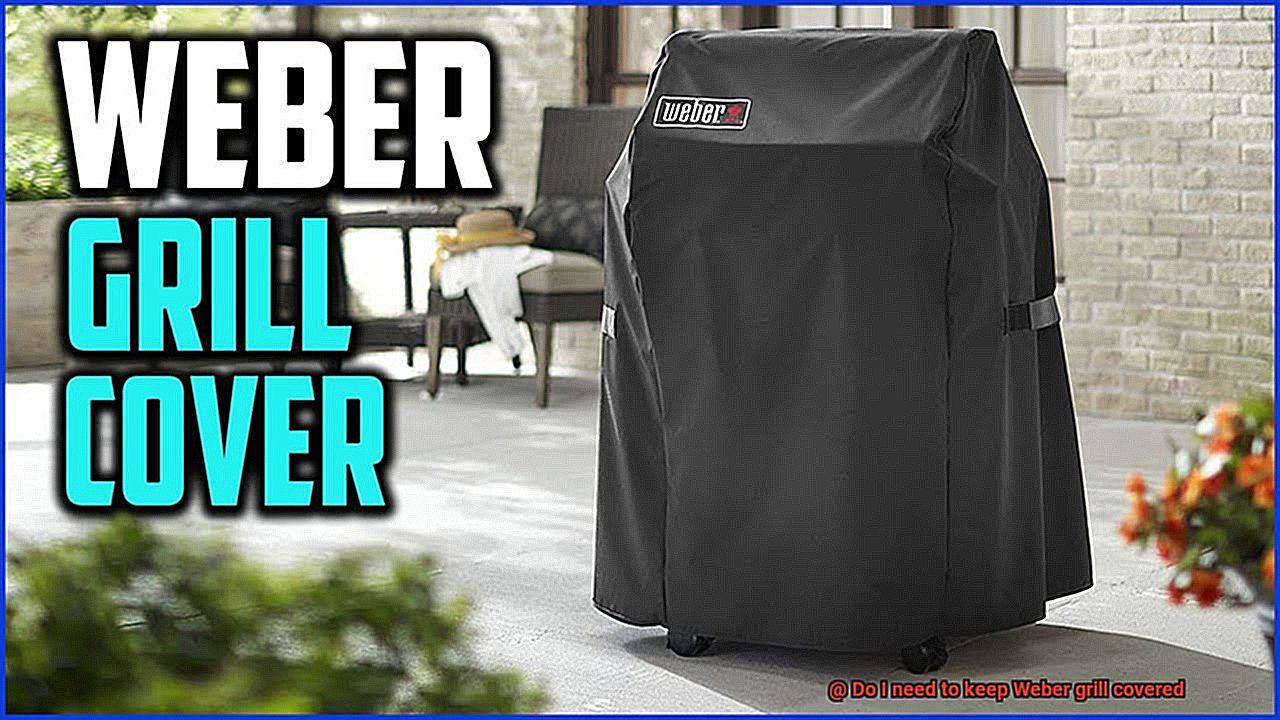
Deterring Unwanted Pests and Animals
Deterring pests and animals is crucial in ensuring that your grill remains in pristine condition.
Among the most common pests that are attracted to uncovered grills are rodents like rats and mice. These pesky creatures can gnaw through grill covers and burrow into the grill, causing damage to internal components. Additionally, their droppings on grates can pose health hazards if not cleaned properly.
Insects like ants and wasps are also drawn to leftover food particles on uncovered grills. They can build nests inside the grill, which can lead to a fire hazard. A sting from a wasp while flipping burgers will definitely ruin your barbecue experience.
Leaving your Weber grill uncovered can also attract larger animals like raccoons and bears. These creatures are attracted to the smell of food, and they can easily damage your grill while attempting to access leftovers. Furthermore, they pose a threat to your family and pets.
So, what can you do to deter these unwelcome visitors? The answer is simple: cover your grill with a high-quality cover that fits snugly over the grill. Ensure that you fasten any straps or cords to prevent it from being blown away by winds. This will not only protect your grill from elements but also keep pests away.
In addition to covering your grill, regular cleaning is essential in preventing pests from being attracted in the first place. Remove any leftover food particles or grease that may have accumulated on the grates or inside the grill.
The Different Types of Covers Available
One of the best and most practical ways to do this is by using a cover. But with so many different types of covers available, how do you know which one to choose? Here are five sub-sections explaining the different types of covers available for Weber grills and their benefits.
Vinyl Covers:
Vinyl covers are a popular choice for Weber grill owners because they are lightweight, easy to use, and affordable. They come in a wide range of sizes and colors, making it easy to find one that fits your grill perfectly. Vinyl covers are also water-resistant, which means they can protect your grill from rain and other types of moisture.
However, vinyl covers may not be the most durable option. They can tear easily if not handled carefully, and they may not provide adequate protection against extreme weather conditions.
Polyester Covers:
If you’re looking for something more durable than vinyl covers, consider polyester covers. They are heavier than vinyl covers, which means they offer better protection against the elements. Polyester covers are also UV resistant, which means they can protect your grill from the damaging effects of the sun.
Polyester covers are also easy to clean and maintain, making them a popular choice among grill enthusiasts. However, they may not be as breathable as other materials, which may lead to condensation build-up inside the cover.
Canvas Covers:
For those who live in areas with harsh weather conditions, heavy-duty covers made from materials like canvas or marine-grade vinyl may be the best choice. These covers are designed to withstand extreme weather conditions like high winds, heavy rain, and snow.
Canvas covers are heavier and more durable than other materials. They provide better protection against extreme weather conditions and have excellent breathability, reducing the risk of condensation build-up inside the cover. However, they may be more expensive than other types of covers.
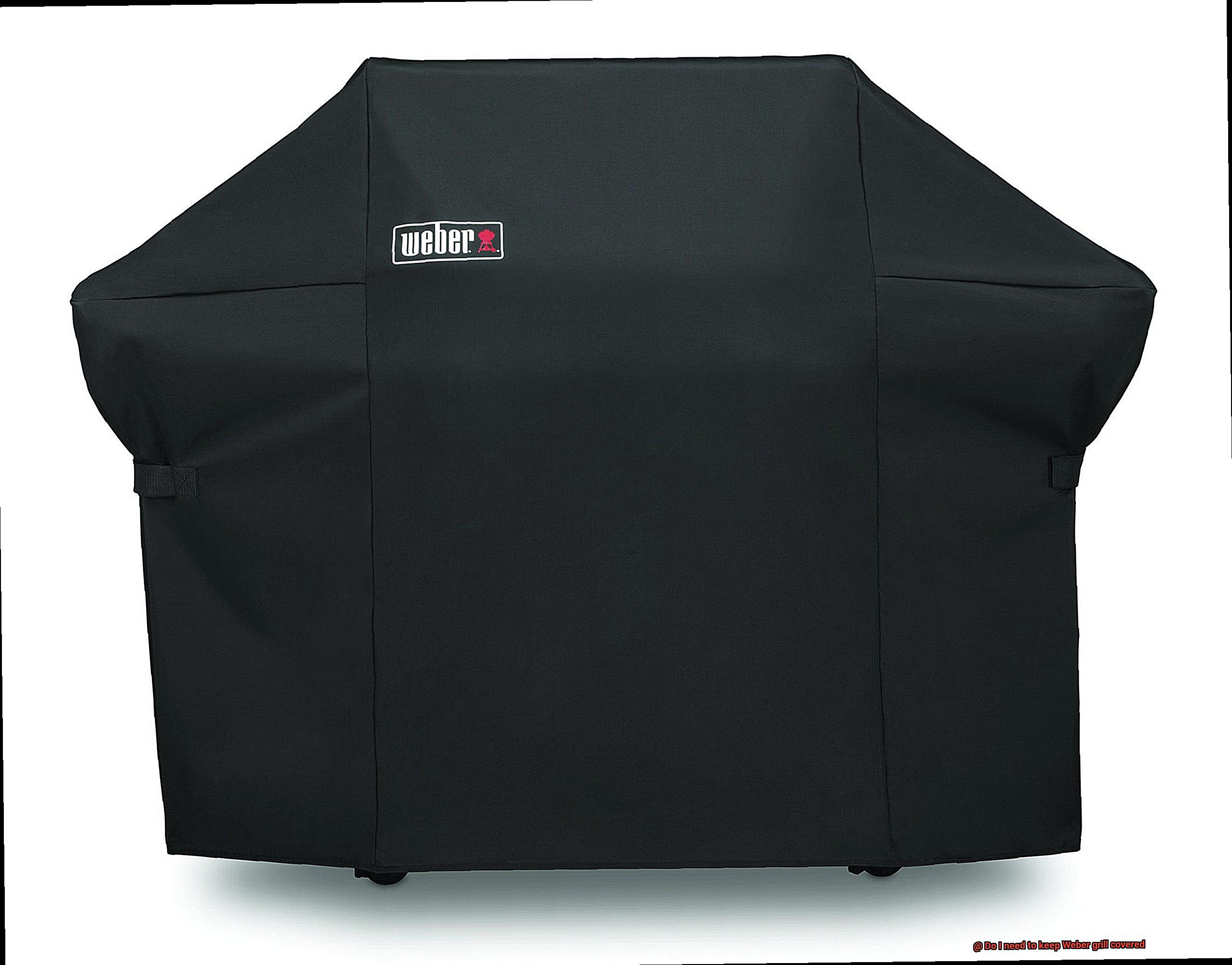
Custom-Made Covers:
In addition to standard types of covers, there are also custom-made covers available for Weber grills. These covers are designed to fit your specific model of Weber grill perfectly, providing superior protection against the elements.
Custom-made covers may be more expensive than standard covers, but they are worth the investment if you want the best possible protection for your grill. They also look more professional and can add a touch of style to your outdoor cooking area.
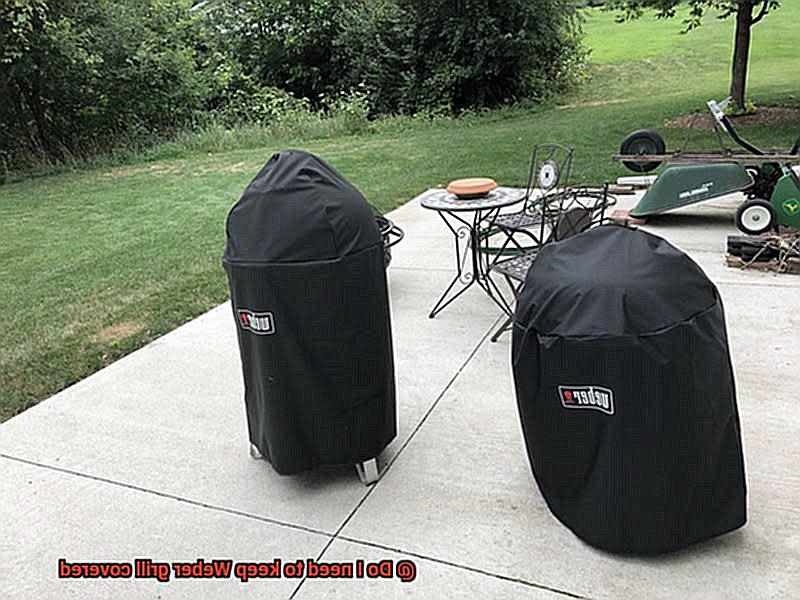
Additional Features:
Lastly, some covers come with additional features such as built-in vents or pockets for storing grilling tools. These features can be beneficial but may also increase the cost of the cover.
It’s essential to choose a cover that fits your grill snugly. A well-fitting cover will not only protect your grill but also prevent dust and debris from accumulating inside it. By considering factors such as material, size, shape, and additional features, you can find the perfect cover for your grill.
Tips for Selecting the Right Cover for Your Grill
With so many cover options available, it can be overwhelming to choose the right one. Here are some tips to help you select the perfect cover for your grill:
Size Matters
Selecting the right size cover is essential. A cover that is too small won’t provide full protection, while a cover that is too big can be difficult to secure properly. Make sure to choose a cover that fits your specific Weber model.
Material Quality
The material of the cover plays a key role in its durability and effectiveness. Look for high-quality materials like polyester or vinyl that are both waterproof and resistant to UV rays. This will ensure that your grill stays protected from the elements and lasts for years to come.
Waterproofing
Make sure the cover you select is waterproof or water-resistant. Water can cause rust and other types of damage to your grill over time, so this feature is essential.
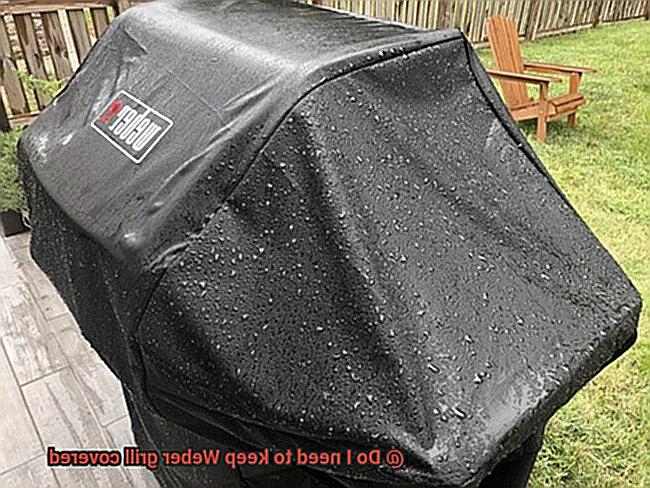
Ventilation
While covering your grill is important, you don’t want to create an environment that traps moisture and causes rust or mold. Look for covers with vents or mesh panels that allow air to circulate and prevent moisture buildup.
Securement Options
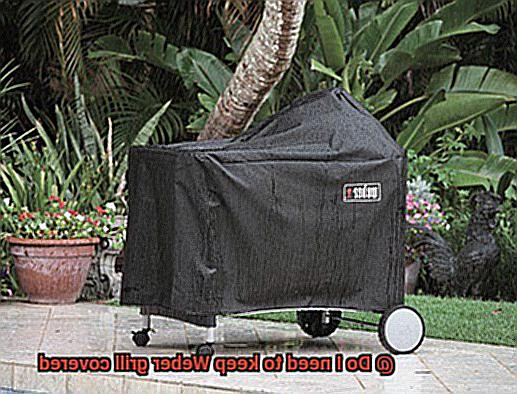
A good quality cover should have securement options like straps or buckles to keep it in place during windy weather. This prevents the cover from being blown off and causing damage to your grill or even becoming a fire hazard.
Brand Specificity
Consider purchasing a cover that is specifically designed for your Weber grill model. This ensures the best fit and protection for your grill. Plus, it’s always better to stick with a trusted brand to ensure quality and longevity.
Care and Maintenance of Your Cover
Your Weber grill cover is your grill’s first line of defense against the elements, so it’s essential to keep it clean, inspect it regularly, and store it properly when not in use.
CLEANING YOUR COVER
Regular cleaning is key to ensuring your cover stays looking its best and lasts longer. Depending on the type of cover you have, a simple wipe down with a damp cloth or sponge may be enough. However, if your cover is particularly dirty or stained, you may need to use a specialized cleaner designed specifically for outdoor covers. Take care to follow the manufacturer’s instructions and avoid harsh chemicals that can damage the material.
INSPECTING YOUR COVER
Periodic inspections are crucial in maintaining your Weber grill cover’s integrity. Check for holes, tears, or frayed edges that could allow moisture or other elements to seep through. Address any damage promptly by repairing or replacing the cover as needed.
STORING YOUR COVER
Proper storage is essential to ensuring your grill cover stays in good condition when not in use. Avoid crumpling it up, instead fold or roll it neatly. Store it in a cool, dry place away from direct sunlight and other sources of heat to prevent damage. Avoid stacking heavy items on top of it that could cause any potential damage.
yuDwSi458Ro” >
Also Read: Can a Weber BBQ Grill Get Wet If left Outside in Rain?
Conclusion
In conclusion, the debate over whether or not to cover your beloved Weber grill may be sizzling hot, but protecting your investment is a must. Shielding your grill from the elements is essential in maintaining its appearance and functionality. A Weber grill cover provides numerous benefits, including safeguarding it from harsh environmental conditions like rain, snow, and wind. It also prevents rust and corrosion, keeps it clean and hygienic, deters pests and animals, and ensures that it’s always ready for use.
When selecting a cover for your Weber grill, consider factors such as size, material quality, waterproofing, ventilation, securement options, and brand specificity. Regular cleaning and inspections are crucial in maintaining your cover’s integrity. Proper storage is also essential to ensure that your grill cover stays in good condition when not in use.
Weber grills are built to last for years to come. By covering your Weber grill with a high-quality cover designed specifically for your model of Weber grill when not in use will provide maximum protection while still allowing air circulation to prevent moisture buildup.

